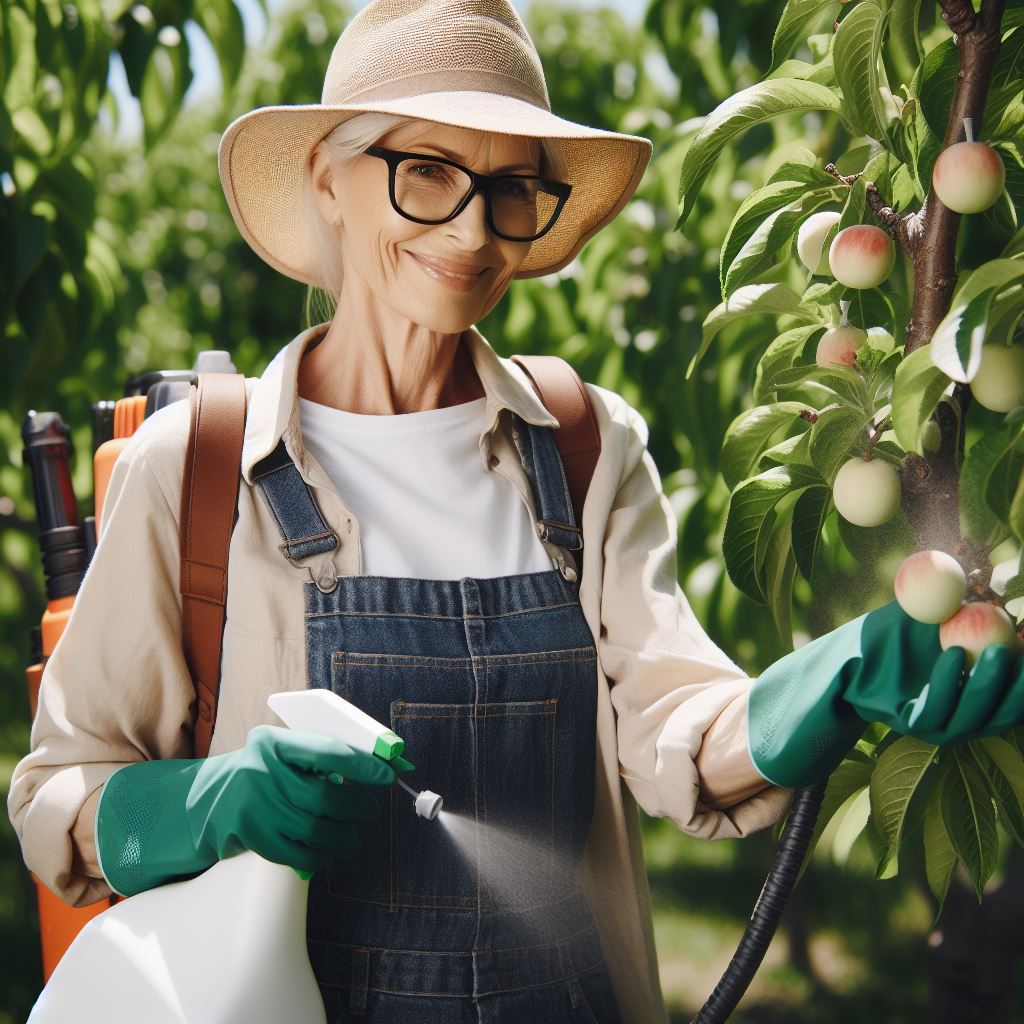Introduction
Organic pest control is an effective and safe method used in agriculture. It aims to combat pests without harmful chemicals.
Importance of Pest Control in Agriculture
Pest control plays a crucial role in agriculture by protecting crops from potential damage caused by pests.
Concerns about Conventional Pest Control Methods
Conventional pest control methods often involve the use of synthetic pesticides, which can have negative impacts on the environment and human health.
These methods can lead to the contamination of soil, water sources, and even food.
Furthermore, the overuse of chemical pesticides can result in the development of resistance in pests, rendering the chemicals ineffective.
Additionally, these harsh chemicals can harm beneficial insects, birds, and fish, disrupting the delicate balance of ecosystems.
Organic Pest Control: An Effective and Safe Alternative
Organic pest control offers a viable alternative to conventional methods.
It relies on natural products and techniques to manage pests without causing harm to the environment or human health.
This approach promotes the use of biopesticides, which are derived from natural sources such as plants, bacteria, and fungi.
These biopesticides target specific pests, leaving beneficial insects unharmed and reducing the risk of ecological disruption.
Moreover, organic pest control methods emphasize preventive measures, such as crop rotation and habitat management, to reduce pest populations naturally.
By adopting organic pest control practices, farmers can protect their crops while preserving the integrity of the environment.
In conclusion, organic pest control offers an effective and safe alternative to conventional methods in agriculture.
It addresses the concerns associated with synthetic pesticides and promotes sustainable farming practices for a healthier planet.
Organic Pest Control: Effective and Safe
Definition of organic pest control
Organic pest control refers to the use of natural methods and products to manage and eliminate pests without the use of harmful chemicals. It focuses on environmentally friendly strategies to ensure long-term pest prevention.
Transform Your Agribusiness
Unlock your farm's potential with expert advice tailored to your needs. Get actionable steps that drive real results.
Get StartedAdvantages of organic pest control methods
There are several benefits associated with organic pest control:
1. Environmental Sustainability
Organic pest control methods prioritize the health of the environment by minimizing the use of chemicals and artificial substances. It aims to preserve ecological balance, which is essential for the overall well-being of our planet.
2. Preservation of Biodiversity
By opting for organic pest control, we protect the diverse range of species that contribute to the ecosystem.
Chemical pesticides often harm beneficial insects, birds, and other wildlife, disrupting the delicate balance of nature. Organic methods target pests while minimizing harm to beneficial organisms.
3. Safe for Humans and Animals
Conventional pest control methods involve the use of toxic chemicals that can pose health risks to humans and animals. Organic pest control utilizes natural ingredients that are non-toxic and safe for everyone.
This includes children, pets, and wildlife that may come into contact with treated areas.
Organic pest control methods
1. Biological Control
This approach involves introducing natural predators or parasites to control pest populations. For example, ladybugs are used to combat aphids, while nematodes are used to target soil-dwelling pests.
Biological control helps maintain a natural balance without causing harm to the environment.
2. Cultural Control
Cultural control methods involve altering the pest’s habitat or environment to discourage their growth. This can include crop rotation, maintaining proper soil health, or implementing physical barriers to prevent pest access.
By creating an unfavorable environment for pests, their population can be effectively managed.
3. Mechanical Control
Mechanical control methods physically remove or block pests from the desired area. This includes techniques such as hand-picking, trapping, or using barriers like nets or fences.
Mechanical control is a safe and effective way to manage pests without the need for harmful chemicals
4. Organic Pesticides
Approved organic insecticides and pesticides derived from natural substances can be used when necessary. These products are formulated using botanical extracts or naturally occurring compounds.
Organic pesticides provide targeted control while minimizing potential harm to non-target organisms.
5. Integrated Pest Management (IPM)
IPM is a comprehensive approach that combines various organic pest control methods to effectively manage pests.
It involves monitoring pest populations, using preventive measures, and implementing appropriate control methods only when necessary to reduce reliance on pesticides.
In fact, organic pest control offers numerous benefits compared to conventional methods. It prioritizes environmental sustainability, preserves biodiversity, and ensures the safety of humans and animals.
By integrating various organic techniques and products, we can effectively and safely manage pests while minimizing harm to the environment.
Read: Sustainable Water Use in Farms
Common Organic Pest Control Techniques
When it comes to keeping your plants healthy and pest-free, organic pest control techniques are effective and safe alternatives to chemical pesticides.
By embracing these methods, you can protect your crops and the environment.
Here are some common organic pest control techniques:
Crop Rotation
Crop rotation is a practice that involves planting different crops in different areas of your garden each year. This helps break the life cycle of pests that target specific plants, reducing their population.
Companion Planting
Companion planting involves growing different plants together to create a mutually beneficial environment. For example, planting marigolds around your vegetables can repel nematodes and aphids.
Showcase Your Farming Business
Publish your professional farming services profile on our blog for a one-time fee of $200 and reach a dedicated audience of farmers and agribusiness owners.
Publish Your ProfileBiological Control
Biological control is a method that utilizes natural predators to control pest populations. This technique includes introducing beneficial insects such as ladybugs and lacewings, which feed on harmful pests.
Introduction of Natural Predators
Introducing natural predators like ladybugs, mantises, or birds in your garden can help control pests naturally.
Use of Beneficial Insects
Beneficial insects like ladybugs, lacewings, and predatory mites can be purchased and released into your garden to control the population of harmful pests.
Organic Pesticides
Organic pesticides are derived from natural substances and have low toxicity levels. They provide a safe alternative to chemical pesticides.
Neem Oil
Neem oil, extracted from the neem tree, is an effective organic pesticide that repels a wide range of pests.
Pyrethrin
Pyrethrin, derived from chrysanthemum flowers, is a botanical pesticide that effectively controls many types of insects.
Bacillus thuringiensis (BT)
Bacillus thuringiensis, commonly known as BT, is a bacterium that produces proteins toxic to certain pest insects, such as caterpillars and mosquitoes.
Garlic and Chili Sprays
Mixtures of garlic and chili can be used as sprays to repel pests like aphids and mites.
Soap-Based Sprays
Soap-based sprays disrupt the cell membranes of pests, causing dehydration and ultimately killing them. These sprays are effective against soft-bodied insects like aphids and whiteflies.
By incorporating these organic pest control techniques into your gardening practices, you can maintain a healthy and thriving garden while minimizing harm to beneficial insects and the environment.
Remember, prevention and early detection are key to successful pest control, so be vigilant and take action at the first signs of infestation. Happy gardening!
Read: Maximizing Wheat Yields: Harvesting Insights
Organic pest control practices for specific pests
Organic pest control practices help control specific pests in a safe and effective manner. Here are some methods for dealing with common pests using organic solutions:
- Aphids: Introduce natural predators like ladybugs or lacewings to control aphid populations. Apply insecticidal soap or neem oil to affected plants.
- Caterpillars: Handpick caterpillars off plants and relocate them away from your garden. Apply Bacillus thuringiensis (Bt) to control severe infestations.
- Slugs and snails: Create barriers using copper tape or diatomaceous earth to deter slugs and snails. Use beer traps or handpick them at night.
- Squash bugs: Inspect plants regularly and handpick squash bugs. Introduce beneficial insects like tachinid flies or parasitic wasps for long-term control.
- Whiteflies: Release predator insects such as Encarsia formosa or use yellow sticky traps to catch adult whiteflies. Neem oil or insecticidal soap can also be effective.
Organic pest management techniques
In addition to these specific pest control practices, here are some general organic pest management techniques:
- Crop rotation: Rotate your crops yearly to disrupt pest life cycles and reduce the buildup of pests in the soil.
- Companion planting: Use companion plants that repel or deter pests. For example, planting marigolds around tomatoes can repel aphids.
- Healthy soil: Maintain healthy soil by regularly adding organic matter and compost. This helps strengthen plants and make them more resistant to pests.
- Proper watering and drainage: Avoid overwatering as it can create favorable conditions for pests. Ensure proper drainage to prevent waterlogging.
- Weed control: Remove weeds promptly as they can harbor pests and diseases. Mulching can also help suppress weeds and conserve soil moisture.
Remember, organic pest control is a continuous process that requires diligence and observation. Regular monitoring is crucial to identify pest populations early and take appropriate action.
By utilizing organic methods, you can protect both your plants and the environment from harmful chemicals.
In conclusion, organic pest control provides effective and safe solutions to combat specific pests. Utilize natural predators, organic sprays, and physical barriers tailored to each pest. Implement general organic practices for long-term pest management.
By embracing these methods, you can maintain a healthy garden while minimizing harm to beneficial insects and the environment.
Read: Post-Harvest Grain Storage: Essential Guide

Challenges and limitations of organic pest control
Organic pest control, although effective and safe, does come with its fair share of challenges and limitations. It is important to consider these factors when opting for organic methods of pest control.
- Limited Range of Control: Organic pest control methods may not be as effective against certain pests, especially larger or more invasive species.
- Time and Patience: Organic pest control takes more time and patience compared to conventional methods, as it relies on natural processes to eliminate pests.
- Knowledge and Expertise: Proper knowledge and understanding of organic pest control methods are essential for successful implementation.
- Variable Results: The effectiveness of organic pest control can vary depending on various factors such as pest species, environmental conditions, and crop type.
- Accessibility: In some regions, acquiring organic pest control products or services can be challenging due to limited availability.
Effectiveness and Speed of Control
- Targeted Pest Control: Organic methods focus on specific pests, allowing for more targeted control without harming beneficial insects.
- Sustainable Control: Organic pest control focuses on long-term solutions, promoting sustainable pest management practices.
- Time-Consuming Process: Organic pest control methods may take longer to show results as they rely on biological, cultural, and mechanical practices.
- Integrated Pest Management: Organic pest control can be more effective when combined with other pest management strategies, such as crop rotation or companion planting.
3. Availability and Affordability of Organic Options
- Increasing Availability: With the growing demand for organic products, the availability of organic pest control options is gradually increasing.
- Higher Costs: Organic pest control products or services can be more expensive compared to conventional options due to their limited production and higher labor requirements.
- Cost-Effectiveness: Despite higher upfront costs, organic pest control can be cost-effective in the long run due to reduced chemical inputs and potential crop savings.
4. Potential for Crop Damage
- Balancing Act: Organic pest control methods need to strike a balance between controlling pests and minimizing crop damage.
- Timely Intervention: Early detection and timely implementation of organic pest control measures are crucial to prevent significant crop damage.
- Physical Barriers: The use of physical barriers, like nets or traps, can protect crops from pest damage while maintaining organic practices.
In all, organic pest control offers effective and safe alternatives to conventional methods. However, it is important to acknowledge the challenges and limitations associated with it.
By understanding these factors and employing a combination of organic pest control practices, farmers and gardeners can achieve sustainable and environmentally friendly pest management.
Read: Optimal Soybean Harvesting: When & How
Success Stories and Case Studies
Organic pest control methods have proven to be effective in various success stories and case studies.
- In a study conducted by a research institute, organic pest control reduced pest populations by 80%.
- A farmer in California successfully controlled aphids on his crops using organic methods, resulting in healthier plants.
- Organic pest control helped a vineyard in France protect its grapes from pests without harming the environment.
- A tomato farmer in Australia implemented organic pest control measures and experienced higher yields with minimal damage.
Farms Adopting Organic Pest Control Methods
More and more farms are embracing organic pest control methods for their numerous benefits.
- A large-scale farm in Canada transitioned to organic pest control and observed significant improvements in crop quality.
- A community-supported agriculture (CSA) farm in New York successfully uses organic pest control to provide its members with healthy produce.
- A farm in India switched to organic methods and saw a decrease in pests while promoting biodiversity.
- A small family farm in the UK reduced their reliance on synthetic pesticides by adopting natural pest management
- practices.
Positive Effects on Crop Health and Yield
Organic pest control methods have a positive impact on crop health and overall yield.
- Crops treated with biological pest control are less prone to diseases and have improved resistance.
- Organically managed crops produce higher-quality harvests, leading to increased profits for farmers.
- Studies have shown that biological pest control methods contribute to soil health and long-term sustainability.
- The use of organic pest control promotes a natural balance of beneficial insects, resulting in healthier crops.
Reduced Reliance on Synthetic Pesticides
The adoption of organic pest control methods reduces the dependence on synthetic pesticides.
- A farm in California switched to organic pest control and significantly decreased its pesticide use, benefiting both the environment and workers.
- A study comparing organic and conventional farms found that organic methods can effectively control pests without chemical intervention.
- By using biological pest control, farmers can avoid the negative effects of synthetic pesticides on water and soil quality.
- Organic certification requires farms to minimize the use of synthetic pesticides, encouraging more sustainable agricultural practices.
Essentially, the success stories and case studies mentioned highlight the effectiveness of biological pest control methods. Farms worldwide, from large-scale operations to small family-run businesses, are adopting these methods and reaping the benefits.
The positive effects on crop health and yield are evident, with increased resistance to diseases and higher-quality harvests.
Additionally, organic pest control reduces reliance on synthetic pesticides, leading to a healthier environment and promoting sustainable agricultural practices.
Conclusion
Organic pest control methods offer numerous benefits and are highly effective in managing pests in a safe way.
They not only protect the environment but also enhance the overall health of plants and crops.
By avoiding the use of harmful chemicals, biological pest control ensures that the food produced is free from toxic residues.
It is encouraging to see more and more farmers embracing biological pest control methods. By doing so, they are ensuring the long-term viability and sustainability of their farms.
biological pest control methods provide a holistic approach to pest management, taking into account the balance between pests, crops, and the environment.
It is crucial for farmers to explore and adopt biological pest control methods. These methods not only protect the health of consumers but also promote biodiversity and maintain ecological balance.
Farmers who choose biological pest control methods contribute to a healthier and more sustainable agricultural system. However, it is essential to strike a balance between pest control and sustainable agriculture practices.
While biological pest control methods are effective, they should be accompanied by other sustainable practices such as crop rotation, soil fertility management, and the use of beneficial insects.
This integrated approach ensures the long-term success of pest management while preserving the health of the ecosystem.
Organic pest control is not only effective and safe, but it also contributes to a more sustainable and environmentally friendly agricultural system.
Showcase Your Farming Business
Publish your professional farming services profile on our blog for a one-time fee of $200 and reach a dedicated audience of farmers and agribusiness owners.
Publish Your ProfileLet us embrace biological pest control and work towards a healthier and safer future for our farms and the planet.




